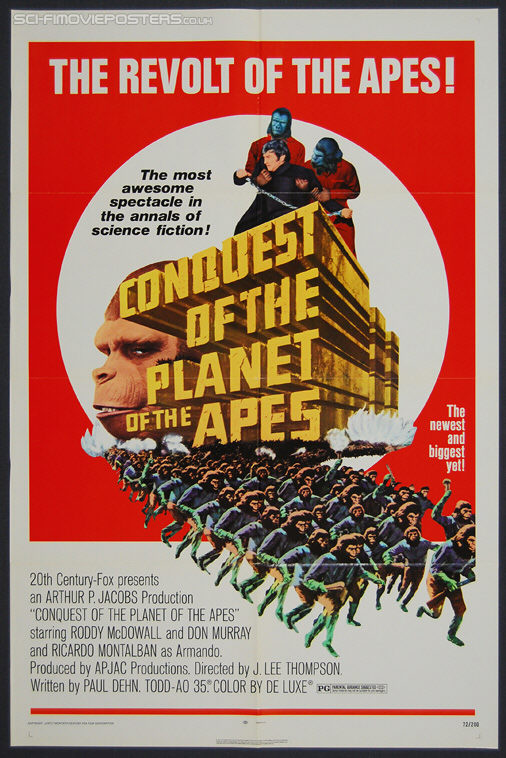 An allegorical tale of fascism and slavery, “Conquest of The Planet of the Apes,” released in 1972, was called by TV Guide as “the best of the four sequels in the hugely successful APES series, as well as being the darkest and most violent.” I think that is up for debate if it’s really the best of the sequels. Roddy McDowall, who you will remember as Cornelius from the previous movies, brings a very heated performance as Cornelius’s son Caesar, who guides the apes in a rebellion against the cruel humans.
An allegorical tale of fascism and slavery, “Conquest of The Planet of the Apes,” released in 1972, was called by TV Guide as “the best of the four sequels in the hugely successful APES series, as well as being the darkest and most violent.” I think that is up for debate if it’s really the best of the sequels. Roddy McDowall, who you will remember as Cornelius from the previous movies, brings a very heated performance as Cornelius’s son Caesar, who guides the apes in a rebellion against the cruel humans.
1991 North America is a police state where dogs and cats have been annihilated by a virus that was brought back by space astronauts. Apes are brought in from Africa and are auctioned off as the new house pets and are trained to perform basic tasks. Armando, the circus owner who you might remember from the end of the last movie (Ricardo Montalban) arrives in the city with grown up Caesar (Roddy McDowall). Eighteen years prior to the events in this movie, Armando hid baby Caesar, the son of Cornelius and Kira who you remember as the intelligent and articulate apes who traveled back in time from the 40th Century and were murdered when they tried to prevent ape domination. Even though Armando warned Caesar not to speak or else his identity would be given away, Caesar is shocked at how the treatment the slave-apes are given by the police and he swears at one of them. Armando is then taken in by the police and is interrogated by the ruthless Governor Breck, played by Don Murray, but Caesar escapes and hides with a group of gorillas that are going to be handed in as slaves.
After he has gone through an intense training and conditioning program, he is sold off to Breck and is put to work in the city’s communication control center. However, when Armando jumps out of the window when he is being interrogated, Caesar explains who he is to the governor’s sympathetic black assistant MacDonald, played by Hari Rhodes, and begins to plan an ape revolution. Caesar is captured by Police Chief Kolp, played by Severn Darden, and is tortured to a point where he has no choice but to speak, but when Breck demands that Caesar be electrocuted; MacDonald quietly goes and shuts off the power preventing Caesar’s murder. Caesar escapes and leads a street fight against the band of soldiers, and captures Breck, but spares his life. That’s when he gets all of the apes together by giving an impassioned speech predicting that man will bring about the destruction of their kind in a nuclear war and that apes will be the dominate ones left on the planet.
TV Guide has said, “CONQUEST OF THE PLANET OF THE APES is a hard-edged thriller featuring a sleekly sinister look and a disturbing tone that's quite different from any of the other films in the series.” Director J. Lee Thompson, who directed the original “Cape Fear,” is also said by TV Guide as “brings a dynamic visual style to the film, utilizing kinetic hand-held camerawork and low-angle, deep-focus widescreen compositions to convey a jittery and menacing atmosphere.” The whole film is filled with menacing anger and hostility (the apes dragged around in chains and beaten by the police dressed like Nazis, the cruel reconditioning where the apes are “trained” with flame-throwers, and the most difficult scene to watch, Caesar being electrocuted), and there’s also some severe social satire in such scenes like when snobby women bully the apes while the animals groom the ladies’ hair and light their cigarettes, and that the entire film takes place in a futuristic neighborhood of the then-new Century City complex next to the old Fox lot, with its ever-present surveillance cameras and outdoor loudspeakers used to call out orders to the public.
TV Guide said this about the last fight scene: “The final hand-to-hand combat between the apes and the militia--a fierce tour-de-force that lasts for 30 minutes and features wholesale slaughter by knife, machine gun, and every weapon imaginable as the city goes up in flames and an impassioned Caesar delivers a tirade against mankind--was explicitly designed to evoke images of the 1965 Watts riots and is extremely effective.” In fact, this film was so violent, that it was the only film in the series to be rated PG (every other film surprisingly were rated G despite the violence and brief profanity), and the studio really brought it down from the original version, afraid that it would turn off the series’ intended family audience (nowadays it would receive a PG-13). Nevertheless, the film was another huge success and Thompson was brought back to direct the final film in the series, “Battle for the Planet of the Apes,” which Fox’s pressure unfortunately agreed for more friendly monkeyshines.
You want to know how "Battle for the Planet of the Apes" was? Find out tomorrow in the conclusion to the original series with my review of the film.
You want to know how "Battle for the Planet of the Apes" was? Find out tomorrow in the conclusion to the original series with my review of the film.
No comments:
Post a Comment